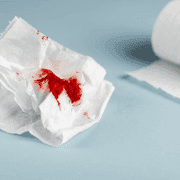Managing Piles Safely During Pregnancy
In This Article
Managing Piles Safely During Pregnancy
Parvathy
Updated on October 11, 2024
Medically verified by Dr. Arya
Fact checked by Dr. Fazeela

Proctology
6 min read
Pregnancy is a beautiful phase in a woman's life . But, along with the joys of meeting the baby inside your womb, you’ll have to endure a lot of physical problems.
Piles (hemorrhoids) is one of the less discussed but one of the most common problems.
This is incredibly uncomfortable for many pregnant women due to the pressure in the pelvic area which is already causing discomfort for most of them.
In this blog, Mykare Health will guide you on how to manage piles safely during pregnancy.
Understanding Piles
Hemorrhoids, also known as piles, are swollen veins in the rectum and anus region. They can be internal or external (under the skin around the anus). They usually develop during pregnancy in the third trimester or in labor because of the extra pressure on the blood vessels in the pelvic area.
Piles are usually harmless, but piles can become a serious cause of discomfort if your body is already dealing with a lot of physical and emotional requirements as you anticipate your new baby.
Untreated, piles can become thrombosed (when a clot forms inside the swollen vein), causing severe pain. That’s why it’s important to seek out early, gentle intervention in order to manage it without harming you or your baby.
Several factors make pregnant women more susceptible to developing piles
-
Increased Blood Flow: As your baby grows, your body produces more blood to supply it. On top of that, this extra blood volume places additional pressure on your veins.
-
Uterine Pressure: When your uterus increases in size, blood vessels can be compressed and slower to bring blood back to your lower body.
-
Hormonal Changes: Specifically pregnancy hormones such as progesterone can soften the walls of your blood vessels, making them easier to swell.
-
Constipation: Straining during bowel movements is another common thing during pregnancy and can cause you piles.
 5 min read
5 min readDon't Ignore Bummy Pain: Could It Be Piles?
 7 min read
7 min readBlood In The Stool: A Sign You Shouldn’t Ignore
 6 min read
6 min readSitting All Day Wreaking Havoc? It Might Be Piles!
Get a Callback Now
Recognizing the Symptoms
Even though piles can be painful, uncomfortable and itchy,they are usually not dangerous. Early recognition of the symptoms is the key so that you can start on treatment before the symptoms progress.
-
Irritation or itching of the anal area.
-
Pain during bowel movement
-
A swelling or lump near the anus
-
Bright red blood when you go to the bathroom (bleeding from the bowel).
If you do experience these symptoms, get them checked out quickly… not only for your comfort, but to avoid problems during the later stages of your pregnancy.
Managing Piles During Pregnancy
Piles during pregnancy can be treated very delicately. Fortunately there are plenty of safe and effective treatment options; natural and medical.
1. Dietary Changes
The simplest way to manage piles is by avoiding constipation. Fiber is important for keeping your bowel movements smooth, lessening the need to strain. You may go with whole grains, fresh fruits, vegetables and legumes.Try to drink enough water (8-10 glasses a day).It puts more pressure on your digestive system if you have large meals. However, eat smaller meals more frequently.
2. Gentle Exercise
Physical exercise can help keep your digestive system working in a smooth way and aid in blood circulation,thereby lowering the risk of piles. Some of the activities that can be adopted during pregnancy are walking, swimming or prenatal yoga. Your healthcare provider should always be consulted before beginning any new exercise routine to make sure it is safe for you.
3. Medical Creams and Ointments
There are a number of over the counter creams and ointments that are made to help soothe piles. Some of these, however, are not safe to use while pregnant. Even if it’s available without a prescription, always check with your doctor or midwife first before using it.
Creams with hydrocortisone or witch hazel may reduce inflammation or itching and may give relief to many pregnant women. Also, it’s important to follow the medication recommended instructions and not use stronger medications unless prescribed.
4. Sitz Baths
A sitz bath is sitting in warm water to relieve discomfort of the lower body. You can buy a special basin for this or you can use your bathtub. Sitting with the area immersed in water for 10-15 minutes can reduce swelling, provide pain relief and encourage healing. You can also add a bit of Epsom salt to reduce inflammation.
5. Cold Compresses
A cold compress placed onto the anal area for 10 to 15 minutes can help reduce swelling, and numb the area, providing temporary pain and itch relief. Make sure you wrap the ice pack in something soft so you don’t hurt your skin in the process.
6. Maintaining Good Hygiene
To prevent and relieve irritation, the affected area must be clean and dry. Gentle patting of the area should follow after using the bathroom with a moist wipe or damp cloth, rather than dry toilet paper. After a bowel movement you can also rinse the area with water.Don’t be too rough on it as that can also cause some irritation to the skin.
Emotional and Mental Support
Piles during pregnancy is not a purely physical challenge. This has an emotional hit on your well being that should not be left unattended to. Adding physical discomfort only adds stress and anxiety to an already intense time. Here are a few ways to care for your emotional health while managing piles
1. Practice Self-Compassion
During the time you can be feeling frustrated with your body, you may experience things like piles. Keep in mind, though, it’s a temporary phase, a time when your body is undergoing tremendous shifts to accommodate a new life. Don’t be too hard on yourself or too much on yourself.
2. Talk About It
Like piles, many women feel embarrassed to talk about the issue, and that is the cause of isolation. Talk to your healthcare provider, partner or moms to be about how you are feeling, so you can feel less alone in your experience. And trust us, you wouldn’t be alone being surprised that piles are actually quite common during pregnancy, but sharing your struggles can bring you comfort.
3. Relaxation Techniques
While deep breathing, meditation or prenatal yoga are all great relaxation techniques that can be beneficial during pregnancy. Indirectly they can help alleviate the discomfort piles; reducing stress, improving circulation and creating a sense of well-being.
4. When Required, Get Help from a Professional
If you’re not sure how to safely manage them, don’t hesitate to speak to a professional. There are great resources available from your doctor, midwife, or even a pelvic health specialist to help provide personalized guidance and support regarding the pelvic pain.
Managing symptoms of piles in pregnancy isn’t just about treating piles, it’s about doing it safely during pregnancy.
Remember, you're not alone. Piles are common in pregnancy and like most things it will go away with the right care and support.
But first, focus on healthy eating, keeping yourself active, and adopt relief measures like sitz baths and cold compresses.
The most important part is to be kind to yourself. Always remember that your body is doing something amazing.
Source Links
Prenancybirthbaby



